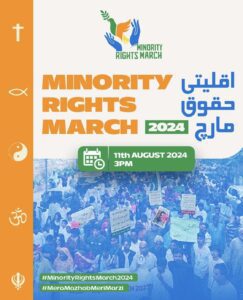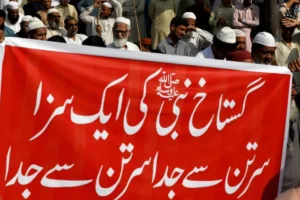As the Minority Rights March approaches on August 11, attention is once again being drawn to the controversial misuse of Pakistan’s blasphemy laws. Originally enacted to safeguard religious sentiments, these laws have been increasingly weaponized against marginalized communities, resulting in severe human rights abuses and social injustices. The upcoming march aims to cast a spotlight on these pressing issues, rallying for urgent and comprehensive reforms to protect the vulnerable and uphold justice.
Understanding Pakistan’s Blasphemy Laws
Pakistan’s blasphemy laws are enshrined in the Pakistan Penal Code, specifically in sections 295-B and 295-C. These provisions were initially introduced during the British colonial period but underwent substantial revisions and expansion in the 1980s under the military regime of General Zia-ul-Haq, who sought to Islamize the nation’s legal and societal structures.
Section 295-B
Section 295-B addresses the offense of desecrating the Quran, prescribing a punishment of life imprisonment for those found guilty of defiling the sacred text. Section 295-C pertains to the use of derogatory language, whether spoken or written, in reference to the Prophet Muhammad.
This section is particularly stringent, as it mandates the death penalty or life imprisonment for those convicted of the offense. The harsh penalties associated with these laws have often been employed misappropriately to suppress dissent, resolve personal disputes, and target minority groups.
Although these laws are purportedly designed to maintain religious harmony and protect Islamic beliefs from insult, their practical application has frequently resulted in increased religious tensions and social injustice. This has raised significant concerns both domestically and internationally regarding their impact on human rights and the rule of law in Pakistan.
The Demands of the Minority Rights March Organization
The Minority Rights March organization is dedicated to advocating for the rights of marginalized communities in Pakistan, particularly focusing on religious minorities who are disproportionately affected by the misuse of blasphemy laws. The organization actively engages in raising awareness, promoting justice, and pushing for policy reforms to protect these vulnerable groups.

In the recent march, the organizers advocated for comprehensive reforms to Pakistan’s blasphemy laws, arguing that they are overly broad and prone to misuse. They propose aligning these laws with contemporary Islamic jurisprudence and establishing clear standards of criminal liability and due process to prevent exploitation. Their demands also include making blasphemy offenses non-cognizable and bailable to ensure arrests are made with warrants and that accused individuals can seek bail, thus preventing arbitrary detention.
Additionally, they emphasize the need for protective measures for those accused, who often face severe threats and violence. They also call for new legislation to address and penalize the misuse of blasphemy laws, aiming to curb false allegations and vigilante justice that disproportionately affect minorities.
These demands are crucial for safeguarding the rights and security of religious minorities in Pakistan, who are often unfairly targeted and vulnerable to violence due to the current misuse of blasphemy laws.
Implications of the Law: Who Are the Targets?
The implications of Pakistan’s blasphemy laws extend far beyond their legal framework, deeply affecting societal dynamics. These laws disproportionately target religious minorities, such as Christians, Hindus, and Ahmadi Muslims, who often face false accusations driven by personal vendettas or ulterior motives. The lack of clear definitions and evidentiary standards in the laws facilitates manipulation, allowing individuals to exploit the system for personal gain.
The impact of these laws includes the perpetuation of social and religious intolerance. A blasphemy accusation can incite mob violence, leading to lynchings, vandalism, and other forms of vigilante justice. The stigma attached to such accusations often affects the accused’s family and community, resulting in ostracization, threats, and violence. This environment of fear and insecurity is particularly acute for marginalized groups, further isolating them and exacerbating their vulnerabilities.
Furthermore, the arbitrary nature of accusations and the harsh punishments contribute to a climate of fear that stifles free expression. Individuals may avoid discussing religious matters to protect themselves from potential allegations, leading to a homogenization of public discourse and stifling intellectual and cultural growth. The misuse of blasphemy laws undermines the rule of law, erodes confidence in the judicial system, and has significant economic repercussions, including dispossession and displacement, which reinforce social divides and contribute to societal unrest.
Historically Important Cases
Several cases have drawn international attention to the misuse of blasphemy laws in Pakistan such as the case of Asia Bibi, a Christian woman, who was sentenced to death in 2009 on dubious blasphemy charges and spent nearly a decade in solitary confinement before her acquittal in 2018. Another high-profile case is that of Mashal Khan, who was a university student, lynched by a mob in 2017 after false accusations of blasphemy.

These brutal incidents highlight the peril of mob justice fueled by unfounded allegations and the severe social consequences of these laws. The following are additional incidents of blasphemy in Pakistan, highlighting the severe repercussions of the law’s misuse, which range from lengthy imprisonments to violent mob killings.
- Rimsha Masih: In 2012, Rimsha Masih, a young Christian girl with a cognitive disability, was falsely accused of burning pages containing Quranic verses. Her arrest sparked international outrage, particularly because of her age and mental condition. She was later acquitted after it was revealed that the evidence had been fabricated.
- Priyantha Kumara: A Sri Lankan national working as a factory manager in Pakistan, Priyantha Kumara was lynched by a mob in 2021 after being accused of blasphemy. The incident, widely condemned, highlighted the severe risks foreigners face under Pakistan’s blasphemy laws.
- Shama Bibi and Shahzad Masih: This Christian couple was brutally murdered by a mob in 2014 after being falsely accused of desecrating the Quran. The mob beat them and then burned their bodies in a brick kiln, demonstrating the lethal consequences of blasphemy allegations and the failure of authorities to protect the accused.
Arafat Mazhar’s Film: A Reflection on the Issue
The urgency of reforming Pakistan’s blasphemy laws is further highlighted by cultural works that address this pressing issue. Arafat Mazhar, an international filmmaker and director of the Engage Pakistan research collective, has contributed significantly to this dialogue through various works. His recent documentary, ‘The Unavoidable Misuse Of Pakistan’s Blasphemy Laws’, delves into the profound impact of these laws on Pakistani society, examining how they are exploited and the resulting human rights abuses. Similarly, his film ‘Swipe’ explores the complex relationship between religion and state in Pakistan, providing a critical perspective on how blasphemy laws are used to target and persecute individuals, particularly from minority communities.
Mazhar’s works not only offer a critical analysis of the blasphemy laws but also underscore the urgent need for reform. By shedding light on the misuse and consequences of these laws, his films contribute to the broader conversation about justice and human rights in Pakistan. They serve as a powerful reminder of the real-world impact of legal and societal issues, reinforcing the importance of the Minority Rights March organization’s demands for comprehensive reform.

Looking Forward
The upcoming Minority Rights March represents a crucial moment for Pakistan The upcoming Minority Rights March, at the Frere Hall, Karachi at 3 pm, is a crucial opportunity for Pakistan to confront the injustices perpetrated by its blasphemy laws. It is an opportunity for the nation to re-evaluate these laws and take meaningful steps towards safeguarding the rights of all its citizens, regardless of their faith. The march’s demands for legal reforms, protection of the accused, and punishment for misuse are essential steps in preventing the persecution of minorities and ensuring justice and equality for all.
Click Minority Rights March Instagram for more updates
Click Arafat Mazhar Instagram for more updates
Related Stories
Mass Arrests Made Following Violent Attacks on Christian Community; Punjab Police Takes Swift Action
Ahmadi Community in Pakistan Living in Fear as Graves and Religious Sites Face Coordinated Attacks
















